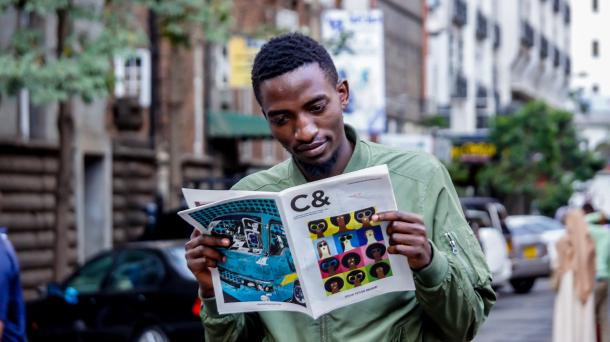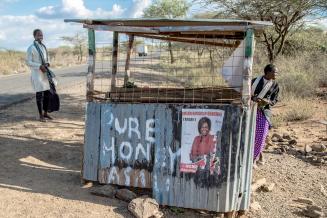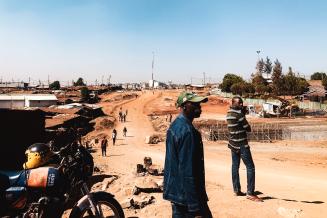News
How UNESCO works to curb online hate speech and disinformation ahead of Kenyan general elections

On 9 August 2022, over 22.1 million Kenyan voters will go to the polls to elect their President, members of the Parliament, and County Governors.
In electoral contexts, social media has been lauded as an equalizer for enhancing free flow of information between candidates and prospective voters. Despite this, digital platforms have been misused to distort citizen’s decision-making process and accentuate divisions in societies. While during Kenya’s 2007 election, potential harmful speeches – including insults against opponents, threats and incitement to violence, defamatory language, propaganda, and covert hate speech – circulated via emails, SMS messages, blogs, radio, TV stations, and newspapers, 2013 and 2017 had similar harmful content spread increasingly on social media.
Five years later, in spite of various efforts, online harmful content remain a key issue in Kenya and a research report prepared and published by Article 19 in 2022 as part of UNESCOs project on Social Media 4 Peace has shown that users/citizens have learnt how to instrumentalize and weaponize social media to propagate problematic content and censor speech in several ways without detection or action by the digital platforms in Kenya.
According to this research report ‘significant attention is yet to be paid to address problematic content and behaviour on social media platforms given their implications on peace and stability in Kenyan society’. In this context, UNESCO together with the Independent Electoral and Boundaries Commission (IEBC) and other media partners came up with a communication campaign entitled “Guaranteeing free, plural and fair elections in times of disinformation” to promote peaceful elections free of hate speech, disinformation and stereotypes. The campaign consists of a series of short animations available in English, Kiswahili and Sheng, a local dialect of Kiswahili mostly spoken by the Kenyan youth (See link to access the developed videos).
As part of its project “Social Media 4 Peace” funded by the European Union, UNESCO also reaffirms its long term commitment towards countering online hate speech and disinformation on social media platforms in Kenya.
Advancing Media and Information Literacy competencies to Combat Online Disinformation
A 2017 study by GeoPoll found out that 90% out of 2,000 people surveyed from 47 counties in Kenya had seen or read false or inaccurate information during the 2017 electoral period, with social media being the dominant source. The study also found that only a third of Kenyans were able to access accurate information about the election.

To remedy this, UNESCO in partnership with the Africa Centre for People Institutions and Society (ACEPIS) and in close collaboration with META, Search for Common Ground, and The Sentinel Project mobilized over 1,200 young people across Kenya to participate in series of trainings on Media and Information Literacy. The trainings helped equip the younger generations with the requisite competencies and practical skills needed to debunk dis-information and counter hate speech online. The trainers adapted modules and toolkits developed by UNESCO such as the Media and Information Literate Citizens: Think Critically, Click Wisely to increase youth critical thinking skills and also invited representatives from prominent social media platforms such as META to engage with the participants through discussions on their community guidelines in relation to harmful content.
Evans Macharia, founder of Vijana African Voices Initiative in Kiambu County, acquired new skills and knowledge on political affairs and learnt how to use media platforms to keep those in authority accountable during the 2022 electoral period in Kenya.
Another beneficiary Fatuma Mohamed Abdullahi from Sleak Girlz organization in Mombasa sought to explore various means of promoting peace through social media, especially leading toward the general elections.
Developing competencies of Media Professionals to deliver reliable information
In Kenya, traditional media such as the Radio, TV, and newspapers remain highly trusted sources of information. However, the competition for ‘breaking news’ sometimes leads to situations where unverified stories are shared by media professionals.
In May 2022, UNESCO supported the Media Council of Kenya (MCK) to equip over 200 media professionals on conflict-sensitive reporting ahead of elections. The workshops deepened the participant’s understanding of the conflictual dynamics and empowered them with competencies and practical skills to report authentic, factual, and context-appropriate messages for peacebuilding and mitigating conflicts. The beneficiaries of this workshop were drawn across the 47 counties in Kenya.
Encouraging Positive Peacebuilding Narratives online with digital technologies
As Kenya is a vibrant technology and innovation hub in Africa, UNESCOs project on Social Media 4 Peace has also supported the development of new digital solutions to counter online hate speech and push forward positive peace narratives. In collaboration with Pwani Teknowgalz – a girl’s led tech Hub in Kenyan coast – UNESCO supported a MobiPeace Hackathon for the development of mobile applications on peacebuilding initiatives in Kenya. This intervention attracted the participation of 50 young girls drawn from Lamu, Mombasa, Kisumu, Nakuru, Nairobi, Kilifi, Uasin Gishu, Laikipia and Marsabit counties in Kenya. Three mobile applications namely Jihusishe (get involved), Semanasi (talk to us), and Data for Peace apps were developed in Swahili, Sheng and English languages.

Because skills and competencies are a requisite to leverage digital technologies for the promotion of peacebuilding narratives. UNESCO partnered with Search for Common Ground to train 50 representatives of civil society organizations from 47 counties on digital advocacy and storytelling for peacebuilding.
One of the participants, Harrit Atyang from Simama Dada Siaya County explained
The training was implemented in close collaboration with organizations such as Africa Centre for People Institution and Societies (ACEPIS), National Cohesion and Integration Commission (NCIC), Universities and Colleges Students' Peace Association of Kenya (UCSPAK), Build Up, The Sentinel Project Safaricom PLC, European Centre for Electoral Support, and UNDP Accelerator Lab.
Roadmap towards the Creation of Local Coalitions for Content Moderation
Through listening to the experiences of conflict-affected communities in Kenya and from the findings of Article 19s mapping research report on content moderation and Build Ups on the legal framework governing harmful content, key recommendations have emerged on the critical need to effectively counter online hate speech and promote peace narratives in digital platforms. One key recommendation is the need for Creation of Local Coalitions on Freedom of Expression and Content Moderation to allow for consistent engagement between technology companies, line government ministries and agencies, civil society organisations and academia.
Despite electoral contexts being conducive for proliferation of online hate speech, they also have provided an opportune moment for state and non-state stakeholders working on conflict issues, peacebuilding, digital rights, and technology to start conversations on how to address the challenges of social media online and offline. This is vital as it will culminate to the already ongoing efforts under UNESCO’s Social Media 4 Peace project on the creation of the Local Coalition on Freedom of Expression and Content Moderation in Kenya.



.png?h=d5895ce4&itok=r8AYfckk&width=289&height=192)

.png?h=a955cd85&itok=DSP2AlPY&width=289&height=192)
_0.png?h=a955cd85&itok=Yc9G9zhO&width=289&height=192)


